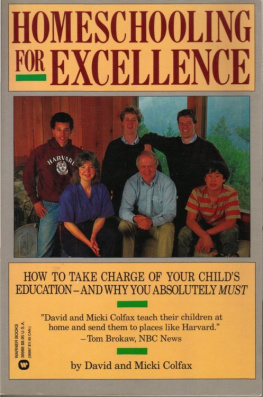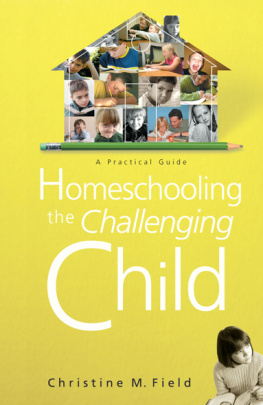SHOULD YOU TEACHYOUR CHILDREN AT HOME?
Some readers may conclude that despite our disclaimers, we do in fact have an educational philosophy.If so, it is only that children will learn, will aspire toexcellence, if we recognize and respect their differentinterests and abilities and give them a chance todevelop them. In our view, every child is gifted oneway or another. The tragedy is that this is deniedevery day, in word and in action, in our schools.
Homeschooling is not a panacea. But for increasingnumbers of families it offers a degree of hope andopportunity. Homeschooling for Excellence is intended to provide a picture of one family's part in whathas emerged as perhaps the most dynamic and creative educational movement in decades. We hope thatour account will be of interest and helpful to parents ofschool-aged children and those who are charged withthe task of educating them.
David and Micki Colfax
HOMESCHOOLINGFOREXCELLENCE
David and Micki Colfax
WARNER BOOKS
A Warner Communications Company
State laws, as they pertain to homesehooling, are subject to various interpretationsby state and local school officials and the courts. Please refer to Appendix 5,"Homesehooling and the Law," for further information.
Warner Books Edition
Copyright 1988 David and Micki Colfax
All rights reserved.
This Warner Books edition is published by arrangement with Mountain House Press
Warner Books, Inc., 666 Fifth Avenue, New York, NY 10103
A Warner Communications Company
Printed in the United States of AmericaFirst Warner Books Printing: October 198810 98765432
Book design by Nick MazzellaCover design by Harold NolanCover photo: James WilsonAVoodfin Camp and Associates
Library of Congress Cataloging-in-Publication Data
Colfax, David.
Homesehooling for excellence / David and Micki Colfax.WarnerBooks ed.
p. cm.
Reprint. Originally published: Philo, Calif. : Mountain HousePress, 1987
Includes bibliographies.ISBN 0-446-38986-2 (U.S.A.)0-446-38987-0 (Canada)
1. Home schoolingUnited States. I. Colfax, Micki. II. Title.LC40.C65 1988
649'.68dcl9 88-14721
CIP
ATTENTION: SCHOOLS AND CORPORATIONS
Warner books are available at quantity discounts with bulk purchase for educational,business, or sales promotional use. For information, please write to: Special SalesDepartment, Warner Books, 666 Fifth Avenue, New York, NY 10103.
ARE THERE WARNER BOOKS YOU WANTBUT CANNOT FIND IN YOUR LOCAL STORES?
You can get any Warner Books title in print. Simply send title and retail price, plus 50
To the Memory of Raj Sookdeosingh
1946-1982
THE SCHOOLBOY
I love to rise in a summer morn,
When the birds sing on every tree;
The distant huntsman winds his horn,
And the sky-lark sings with me.
0! what sweet company.
But to go to school in a summer morn,
O! it drives all joy away;
Under a cruel eye outworn,
The little ones spend the day,
In sighing and dismay.
Ah! then at times I drooping sit,
And spend many an anxious hour,
Nor in my book can I take delight,
Nor sit in learnings bower,
Worn thro' with the dreary shower.
How can the bird that is born for joy,
Sit in a cage and sing.
How can a child when fears annoy,
But droop his tender wing,
And forget his youthful spring.
O! father & mother, if buds are nip'd,
And blossoms blown away,
And if the tender plants are strip'd
Of their joy in the springing day,
By sorrow and cares dismay,
How shall the summer arise in joy
Or the summer fruits appear.
Or how shall we gather what griefs destroy
Or bless the mellowing year,
When the blasts of winter appear.
William Blake,
from SONGS OF EXPERIENCE, 1794
Contents
1. Teaching Our Own
2. A Homeschooling Odyssey
3. The Trouble With School
4. The Homeschooling Alternative
5. Before Basics
6. Tools for Learning
7. The Three R's
8. Beyond Basics
9. Beyond Homeschooling
10. Some Homeschooling Questionsand Answers
11. Teaching Our OwnAnd Others
APPENDIX 1: A Homeschooling ReferenceLibrary
APPENDIX 2: Children's Magazines: FourFavorites
APPENDIX 3: Microscope Books forYounger Readers
APPENDIX 4: One Hundred (More or Less)Favorite Books Remembered
APPENDIX 5: Homeschooling and the Law
APPENDIX 6: Selected Resources
APPENDIX 7: Daffodils and Diesels
Acknowledgments
Many friends have contributed to the development of our homeschooling ideas and activities over the years. We areespecially grateful to the following, who, contrary tousual practice, we hold collectively responsible for ourfailures as well as our successes: Bruce and LingAnderson, Terry Anderson, Bob and Karen Altaras,Angel Arzan, Lew and Janet Baer, Peggy Bates,Jennifer Bice, Chris Bing, Ann Bullwinkel, Normanand JoAnn Charles, Manning and Irene Davis, JanDizard, Toby Egeth, Lelia Filiatrault, Jim Gibbons,Rob and Barbara Goodell, Bob and Roxanne Hedges,Bruce Hering, Diane Hering, Lucile Herreid, Ericand Pat Larson, Don and Patti Lipmanson, KurtLorenz, Mary Luther, Steve McKay, Virginia Nash,Grace Neill, Nancy Nonnencamp, Joseph Petelle,Judy Pierce, Chuck Ream, Vernon and CharleneRollins, Robert Salisbury, Steven Schack, GerdSchroeter, Morris Shepard, Don Sheckler, Will Siegel,Margaret K. Simmons, Ed and Janet Stockwell, AliceWalker, David Walker, Jan Wax, and Michael Winfree.
Introduction
For the last fifteen yearswe have educated ourchildren at home. Ouroldest son, Grant, graduated with high honors fromHarvard, and was the recipient of a Fulbright fellowship. His brothers Drew and Reed are presentlyundergraduates there. Our youngest son, Garth, thirteen, has a few more homeschooling years ahead ofhim.
When Grant was admitted to Harvard in 1983,his educational experience received widespread attention, and we found ourselves being cast in the role ofhomeschooling "experts." It was a role we did our bestto avoid, in part because we felt that parents did notneed yet another set of authorities telling how theyshould raise their children, and in part because webelieved that our experiencesas teachers-turned-rancherswere so different from those of most parents as to make them of little real value to those whohoped to learn from us.
However, as we talked with hundreds of parents over the next few years, we came to therealization that there was, and continues to be, a needfor the exploration of possibilities and a sharing ofexperiences among parents who want to see theirchildren obtain the best education possible. And whenDrew and Reed were admitted to Harvard in 1986 and1988, we found ourselves increasingly being calledupon to tell our story.
Doing that turned out to be a more difficult taskthan we had envisioned. Our homeschooling programwas not derived from a set of neatly-organized principles that guided our day-to-day activities. We did notattempt to implement a particular educational philosophy, but, rather, attempted to respond to the evolvingneeds of the children more or less in an ad hoc fashion.Because of this, our subsequent efforts to reconstructand rationalize what was largely a trial-and-errorprocess proved to be a rather complex undertaking.We discovered that our deep-seated aversion to educational ideologies in general, and pop ideologies inparticular, made it impossible for us to condense adecade and a half of experience into a few easily-apprehended directives which, if followed, wouldensure homeschooling success. The educational experience is simply much too complex, too varied, and toorich to be reduced to a neat formula or two, or a set ofpat and trendy phrases.
Next page







